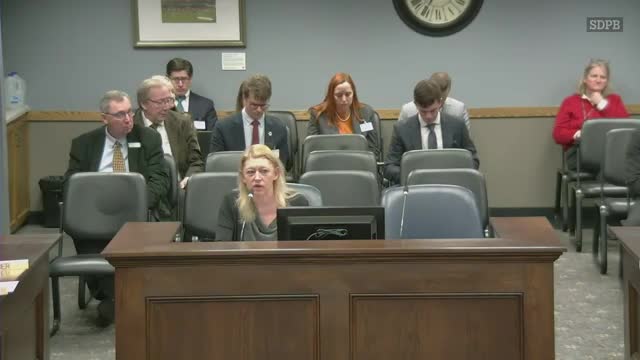Appropriations committee recommends higher fee caps for barber licensing board to preserve independence
Get AI-powered insights, summaries, and transcripts
Subscribe
Summary
The Senate Appropriations Committee unanimously gave SB 28 a due-pass recommendation after the Board of Barber Examiners and the South Dakota Barber College said higher fee caps are needed to sustain board operations, support a new licensing database, and preserve an independent barber board.
The Senate Appropriations Committee gave Senate Bill 28 a unanimous due-pass recommendation after the Board of Barber Examiners and barber-school representatives said higher statutory fee caps are needed to stabilize the board's finances and prevent consolidation with the cosmetology commission.
Jody Amer, director of professional licensing for the Board of Barber Examiners, told the committee the board has far fewer licensees (around 200 barbers statewide) than related boards and has exhausted reserve funds. "The board's licensee database, its most essential tool has become old and brittle and now poses risks and limitation to the board's operations," Amer said, adding the board needs updated systems to support online payments and renewals.
Donnie Joseph, owner of the South Dakota Barber College and a proponent, said the fee-cap increase is intended to help the board remain independent from the cosmetology commission. Joseph also described a practical-exam bottleneck: while written exams are available online, practical exams require board members to proctor on-site and currently occur infrequently, delaying full licensure for graduates.
Committee members focused questions on exam frequency, how the fees were calculated and the potential impact on small-town barbers. Amer said the caps in the bill are maximums; boards will set actual fees by rule, and the fee model was based on a five-year projection intended to sustain the board's operations without general fund support. She said the board currently operates at roughly 0.2 full-time equivalent staff for barber licensing and that higher fee revenue could fund more exam dates and staff time.
Supporters emphasized that allowing the board to increase fee caps would let it restore services cut to preserve solvency and avoid merging with the cosmetology commission, which some barbers oppose.
Senator Miskivens moved due-pass; Senator Lapke seconded. The committee recorded nine yes votes and recommended the bill to the floor with a due-pass.
Why it matters: proponents said the barber board serves small numbers of licensees and needs higher fee authority to maintain licensing services and data security without general fund dollars. Opponents did not appear in committee testimony; some senators said they expect to vote for the increase but will watch for concrete improvements in exam availability.
What comes next: SB 28 moves to the Senate floor with a committee due-pass recommendation.
